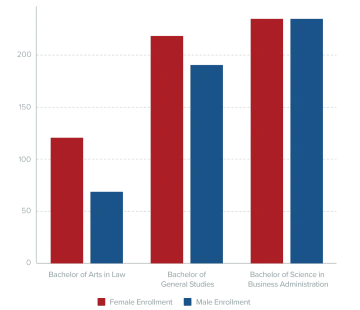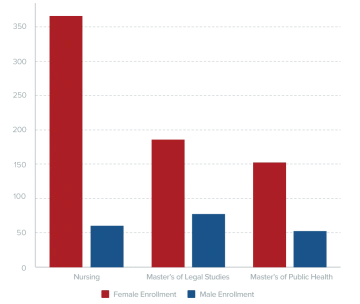
The Most Popular Majors for Women
As far as graduating with a degree, the National Center for Education Statistics states that between 2022–2023, more than 1.1 million women earned their bachelor's degree compared to over 816,989 men. Over half a million women earned their master's degrees compared to 361,374 men. Women lead in doctorate degrees as well.
Career Outcomes
A significant number of high-paying jobs for women are direct career outcomes of these majors, making them some of the best college majors for the future for women.

Business Administration - Eller College
Bachelor of Science in Business Administration
A Bachelor of Science in Business Administration (BSBA) can set you on the path to becoming a Chief Executive Officer (CEO). CEOs earn the highest salaries of any management position and lead organizations in the public and private sectors. The work is demanding and time-consuming, but your hard work will pay off in a high income. Female CEOs earned a median annual income of $132,000 in 2021, according to bizwomen.

Nursing Practice
Doctor of Nursing Practice
At the master's level or earning a Doctor in Nursing Practice (DNP) will prepare you to succeed as a Nurse Practitioner, providing primary or specialty healthcare. According to the US Bureau of Labor Statistics, female nurse practitioners earned a median annual income of $117,670 in 2020.

Law
Bachelor of Arts
Earning a BA in Law will launch your career early with a legal internship, qualify you for an accelerated path to law school to earn a Juris Doctor (JD). Typically, a JD can be achieved in three years of full-time study. You will train to become a practicing attorney who represents clients. As practicing attorneys, women can earn a median income of $115,365 annually, according to Zippia.
Inequities in College Majors
A prevailing problematic trend is the inequities in college majors that can affect the wage gap between men and women that persists today.
Take, for example, the nursing field. Despite the dominance of women in the area, men earn more than women. According to Nurse.org, male nurses make an average of $5,000 more per year than female nurses, according to Nurse.org.
Public health is another field where the percentage of male students (19.1%) is eclipsed by the rate of female students (80.9%). According to one study, female employees of the US Department of Health and Human Services earned about 13% less than men in 2010 and 9.2% less in 2018.
Bizwomen found that the pay gap between male and female startup CEOs grew wider during the pandemic. According to the Associated Press, female CEO median pay rose 26.4% in 2021, but the pay gap between men and women persists.
The United States Census Bureau found that even though the number of female lawyers is at a record high, at mid-career, when earnings peak, the top 10% of female lawyers earn $200,000 less a year than the top 10% of male lawyers.
Why Does the Gender Pay Gap Persist?
Looking at the considerable gains women have made in high-income career fields, one might ask why they are still earning considerably less than men.
A few factors seem to arise:
- According to the Pew Research Center, despite women increasing their presence in higher-paying jobs traditionally dominated by men, women continue to be overrepresented in lower-paying occupations.
- Motherhood can also interrupt women’s career paths and impact long-term earnings. Once women become mothers, juggling family caregiving responsibilities and work can be a challenge.
- According to this article, men are also more likely to negotiate for a higher salary.
How to Narrow the Gap
With the continued increase in women earning degrees and entering high-paying career fields, the pay gap will keep narrowing. The number of college-educated women surpassing the number of college-educated men in the workforce will force businesses to address income disparities.
Online degree programs also allow flexibility for mothers looking to advance in their current field or earn an advanced degree. Learn about the Arizona Online learning experience.
Women can advocate more for themselves! Here is an excellent article from the Cut to get you hyped to know your worth and to fight for what you deserve.










